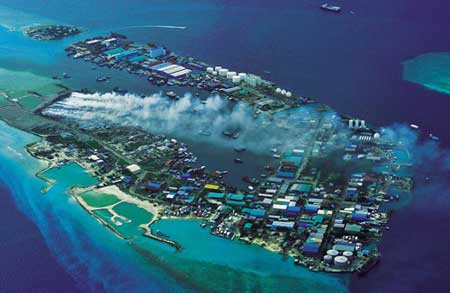 |
|
Smoke rising from refuse on Thilafushi. Attention has been turned on the environmental damage; large amounts of asbestos, lead and other toxic metals have been dumped into the lagoon.(Agencies) |
|
Three-quarters of a million tourists flock to the pristine, white beaches every year - but this booming industry has come at a price. When the influx of foreigners left the government struggling to cope with a relentless stream of rubbish, their answer was to turn one of this islands into a dumping ground. Clouds ofpungent, toxic smoke rising from open fires, piles of filth made up of plastic bottles, crisp packets and consumer detritus... it'sa far cry fromthe white sands, crystal-clear waters and gently swaying palm trees that we associate with the Maldives, the quintessential paradise island holiday destination set in the Indian Ocean. Of its 200 inhabited islands, which are spread across an area of 35,000 square miles, 99 are dedicated resorts. Three-quarters of a million tourists visit every year – more than double the domestic population. Of these, over 100,000 travel from the UK. The capital, Malé, is four times more densely populated than London. Given these facts, it's hardly surprising that the Maldives has a waste disposal problem. What you are seeing here is a view of the Maldives on which no honeymooners will ever clap eyes. Four miles west of Malé is the country's dumping ground, Thilafushi – or Rubbish Island as it has simply become known. The country dumps upwards of 330 tons of rubbish on the island every day, a figure attributed largely to the tourist industry on which the chain of atolls relies. Each visitor generates 3.5kg of waste per day. Now, the government of the Maldives has belatedly banned the dumping of waste on the island, due largely to an increase in the number of waste boats 'fly-tipping' directly into the sea, fed up with waiting seven hours or more to offload their cargo. The freighters are now ferrying debris to India instead. (Read by Emily Cheng. Emily Cheng is a journalist at the China Daily Website.) (Agencies) |
每年,全球有75万名游客来到纯净的马尔代夫海滩,但繁荣的旅游业也让当地付出了代价。大量外国游客持续遗留下的垃圾令当地政府疲于应对,不得不将一座岛屿变成垃圾场。 焚烧垃圾产生的气体刺鼻有毒,塑料瓶、包装纸、游客丢弃的杂物堆积成山,这与白色沙滩、清澈透明的海水以及摇曳的棕榈树等我们对马尔代夫的印象格格不入。这座经典的度假胜地“天堂岛”座落在印度洋。 马尔代夫有人居住的200座岛屿分布在3.5万平方英里的海洋上,其中99座已专门开发成度假胜地。 每年有75万人来马尔代夫旅游,是当地人口的两倍多。这其中有超过10万名游客来自英国。 马尔代夫首都马累的人口密度是伦敦的4倍。因此马尔代夫的垃圾处理难题就不足为奇了。 你在这里看到的,是去马尔代夫度蜜月的情侣们绝不会看到的情景。 斯拉夫士岛在马累西部四英里,这里是马尔代夫的垃圾倾倒场,简单说也就是人们所说的“垃圾岛”。 马尔代夫每天在该岛上倾倒超过330吨垃圾,垃圾成山大部分原因是岛国马尔代夫依赖旅游产业。每位游客每天产生3.5公斤垃圾。 如今,马尔代夫政府已经禁止再向该岛倾倒垃圾,这主要是因为越来越多的垃圾船不愿等待7个小时甚至更久的时间卸货,而直接向海里“违法倾倒”。现在,垃圾船改为将垃圾运往印度。 相关阅读 (中国日报网英语点津 Julie 编辑:旭燕) |
|
Vocabulary: pungent: 刺激性的,辛辣的 a far cry from: 相距甚远,完全不同 fly-tipping: 违章倾倒废物,违法倒垃圾 |
